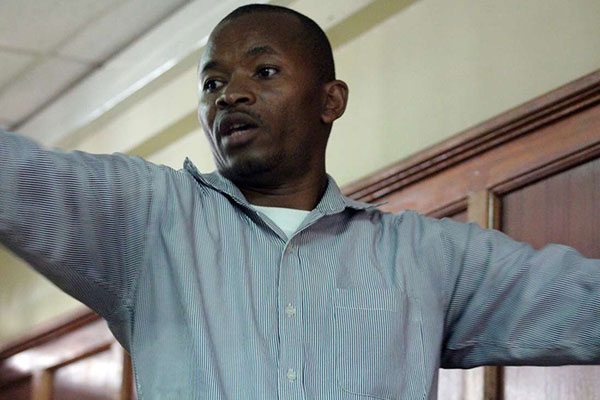Police informers could be the sleepy shopkeeper, the gas delivery dude…your boda boda guy like Peter Ngugi who handed Kimani to his killers
By Pascal MJ Owade
Contributing Editor
That shoe shiner with cracked lips and unpolished shoes could be a police informer. So could the roaster fanning maize cobs at the bus stop. Count in too that barreled brown counter girl at your local pub.
The court case on the gruesome murder of lawyer Willie Kimani, his client and a taxi driver, exposed police informers and their criminal underbelly. One of the key suspects turned state witness, Peter Ngugi, was a boda boda operator who doubled as a police informer.
For police, the entry of boda bodas into every Kenyan village and hamlet made recruitment of informers as variegated as the quality of intelligence they provided. Police informers are thus selected from the gamut of unlikely suspects: The sleepy shopkeeper and gas delivery guy know who’s moved houses. Their daily engagements allow them to watch, record, listen. They deliver info to cops as their work allows for unsuspicious movements. The shopkeeper buys stock, gas guy can hop on a bike to deliver cylinders but also stop to pitch suspicions to coppers.
Besides info, police informers come in handy when cops need a sidekick for dirty jobs like extortions, threats
Police informers, are an important cog in the wheel of gathering info cops can’t access and which they use to detect and deter crimes. In Kenya, successful prosecutions of drug trafficking operations and organized crime invariably depend on police informers.
The planned terrorist attack in Mombasa earmarked for Mashajaa Day on October 20, 2019 was scattered by a police informer. Three suspects were shot dead, seven others arrested. Besides info, police informers come in handy when cops need a sidekick for dirty jobs like extortions, threats, murders. Camouflaged hustling -like the njugu karanga hawker- allows them to trail victims, sell them out for the slaughter.
Ngugi, for instance, drove the bodies to the Ol Donyo Sabuk River where they were dumped. Ngugi’s errand was also to dispose the taxi driver’s car which he gassed to Limuru, an area he knew well. But first, an informer like Ngugi, has to be recruited.
Police masquerade as crooks in cells just to hear criminals incriminating themselves
Leliman had shot Mwenda on the leg and was sued. Leliman faced a possible sack after Mwenda reported the matter to the Independent Police Oversight Authority (IPOA), which was on Mwenda’s side. Leliman thus needed help in killing Mwenda and lawyer Kimani to scuttle the case. Muiruri, unfortunately, was hired on the day the case went for hearing at the Mavoko Law Courts in Athi River, Machakos County-where the victims were to be picked and later killed. Ngugi sang in court like a radio with new batteries on how the murder was executed.
Methods include recruiting former cops, reformed criminals, crooked snitches and accomplices turned state witnesses. Hopefuls who failed police recruitment over missing teeth, flat feet, tattoos, pothole size birth marks and dismal performance in physical exercises, are also easy prey.
A former jailbird told Undercover that “criminals about to be released are also targeted as most can hardly find work due to lack of Certificate of Good Conduct. Money paid to them as informers, since they know and are familiar with crooks, is normally welcome for survival.”
The jailbird who had been arrested for the murder of an airline steward but was later released after seven years, added that “police can come into the cell masquerading as crooks just to hear criminals incriminating themselves and others who were not arrested. Then they use the info to arrest those adversely mentioned and recruiting them as police informers in exchange for freedom.”
Majority of informers are men but women are recruited too. They are perfect vessels for trapping, transporting and selling out male criminals through alcohol and sex.
Besides being fixed, police informers are also killed when their cover is exposed
Later, a senior officer confessed that Mwangi “was among informers who helped police penetrate criminal gangs. He knew so much about criminals and was always willing to give information when called upon. At times we had to restrain him.”
Besides being fixed, police informers are also killed when their cover is exposed. Mungiki, the outlawed sect, executed suspected informants in Central Kenya in 2007. Mungiki abducted, tortured then hacked informers to death before displaying their heads on fences by the roadside. Victims were sometimes dismembered.
Multiple security sources told Undercover that remuneration for informers could range from reduced sentences for state witnesses, successful appeals or financial stipends. Others use their police contacts to broker deals, stealing court files, destroying evidence or subduing court witnesses into submission.
But recruitment of ordinary Kenyans, explains a former cop who was dismissed during the police vetting in 2017, is done using unscrupulous means like harassment and blackmail. Ngugi told the court that he was a boda boda operator in Kabete where he faced incessant and unwarranted police harassment, but little did he know he had been singled out as a potential informer in 2011.
He had reported about the situation and was asked to become an informer in exchange for clemency. His recruiter was later transferred to Busia and later Mlolongo from where he introduced Leliman who in turn roped in Ngugi for the Willie Kimani hit.
After recruitment, informers are passed on to specialized officers who handle them
After recruitment, informers are passed on to specialized officers who handle them. They ensure they keep their cover besides selecting meeting venues and “once recruited, the informers lose contact with their recruiters and are henceforth handled by the specialists. It can be a rough business,” says an officer who sought anonymity. Ngugi had lost contact with his recruiter until they were reunited when he was transferred to Mlolongo.
Ngugi’s eight years as a police informer came to an end when he was arrested and charged with the murders of the three. Also arrested and arraigned in court are Leliman, Leonard Mwangi (who arrested the three while they were leaving Mavoko Law Courts and drove them to Mlolongo Police Post), Silvia Wanjiku, and Stephen Cheburet.
One thing all police informers receive is a legal privilege: the right never to be called to account for information they provide. But it turns out Ngugi is now a state witness against his accomplices-all now awaiting sentencing.
Of all Kenyan police informers, few became as famous, and expose the dirty under belly of their work than Kisilu Mutua and Chege Thuo in 1965- the year an assassination was used as a tool of political management in Kenya.
Kisilu was to play a vegetable hawker by day in Eastlands, but haunt bars in crime-infested River Road at night
Kisilu, like most informers was recruited by blackmail. He traded his freedom after a tire theft,to be a police informer. Kisilu was to play a vegetable hawker by day in Eastlands, but haunt bars in crime-infested River Road at night and where his handlers dropped in to pick info. Kisilu was then handed over to his handler codenamed ‘Sammy’-the go-between Kisilu and the recruiter at the Special Branch.
It took 35 years for Kenyans to know that Kisulu moved from police informer working in a bar in down town Nairobi to the fall back guy of the assassination through his tell-all statement, which was not produced in court, but was kept in police archives. What nailed him was a second statement he said was written under duress, but Judge Ainley dismissed it.
Chief Inspector Patrick Shaw, who later became one of Kenya’s famous crime busters signed Kisilu’s first statement before it was later put under lock and key. Being too naïve, security officers at the Special Branch fixed him as the fall back guy for the Pinto murder.
The riskiest informers are those on the trail of terrorists
Informers have been part of Kenya Police since colonial times. Most were hired to weed out Mau Mau adherents during the State of Emergency. Famous anthropologist Louis Leakey, with his fluency in Kikuyu spied for the Colonial Police as American Caroline Elkins notes in Britain’s Gulag: The Brutal End of Empire in Kenya, published in 2005. Leakey often recruited the Kamba as police informers as they could single out Kikuyus on the run from the proximity of their dialects.
The riskiest informers are those on the trail of terrorists. In December 2015 David Goldman of security website, intelligencebriefs.com, noted that the Amniyaat (Al-Shabaab Intelligence wing), killed five Kenya security informers in Norther Kenya and buried them in a shallow grave in Mandera County. The hit had been ordered by Abdurahman Mohamed Kuno, a jihadist Commander in Juba, South Sudan.
A year before, five former Kenya police informers threatened to withdraw their services over lack of payment for information they provided on al-Shabaab, inter-clan clashes and political incitement in Northern Kenya. Abdi Mohamed, a 33-year-old resident of Garissa County who requested a pseudonym over fears of al-Shabaab reprisals lamented that “It is a risky job to spy on the terrorist group, yet the government cannot even reimburse us the money for the expenses we incur.”


Like!! I blog frequently and I really thank you for your content. The article has truly peaked my interest.